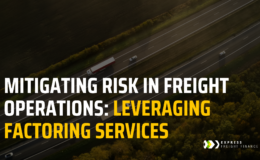Whether they are routine checks, spot checks, or something else, highway patrol stops can potentially ruin a trucker’s day. Highway patrol stops can cause truckers to lose time and mileage, place them out of service, or worse. So how can truckers handle these stops to make them painless and get back on the road quickly?
Be Prepared and Professional
The rivalry between truckers and highway patrol, as glamorized by Hollywood in the 1970s, is long behind us. Highway patrol officers are just trying to do their jobs. If you approach them with a professional attitude, you can get right to the heart of the matter and minimize delays.
Also, have any necessary paperwork ready for them to look at if they happen to ask for it. Rummaging around in your cab to find things takes up their time and yours. Some documentation, like IFTA and IRP credentials, can now be shown electronically from your smartphone.
Listen to Directions
Not everything is uniform throughout the country. Ramp signs may be different. The laws governing scale weights may change or require that highway patrols make more frequent checks in various locations. If you are stopped for a simple compliance check, the best thing to do is comply.
Note that there are even apps available that store your last successful scale bypass, so you can show officers when they ask.
Make Sure Your Truck and Driving Don’t Attract Attention
Highway patrol officers are tasked with keeping our roads safe. As such, officers are always on the lookout for visible cues that might be symptoms of larger violations. Missing reflector tape, broken lights, and more can push highway patrol officers to pull over trucks for a full inspection.
Since speeding contributed to over 25% of traffic fatalities in 2017, highway patrol officers are always wary of truckers going over the speed limit or driving erratically.
Stay Calm
Truckers have extremely important jobs, as do highway patrol officers. If you are pulled over, it is not a personal issue that the officer has with you. Their job is to ensure road safety, and that can mean something as simple as a scale check. The calmer you are, the easier it will be for you to think clearly and get back on the road with minimal delays.







